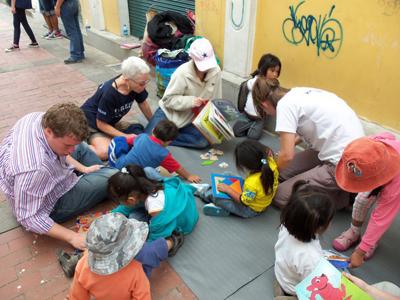
Alternative Breaks takes students to domestic and international locations to volunteer. (Courtesy of Alternative Breaks)
Every year, SMU students sign up for the SMU Alternative Breaks program that sponsors domestic and international trips to engage students in service learning.
During this past fall break, students traveled to Austin, San Antonio, and Atlas, Ark. for community service.
Students who traveled to San Antonio volunteered at Haven for Hope, the largest homeless transformation campus in the U.S. Doors Network, an on-ground supervising organization, arranged the students’ site visits.
Haven for Hope provides a central location for several different organizations to work for homeless populations, including chronically homeless men, women, veterans, and the physically and mentally disabled. The diversity among homeless populations shocked SMU senior Christina Moreno.
“These people come from all backgrounds,” Moreno said. “They all have to live together and coexist, regardless of who they are or where they come from. There are veterans and teachers, alongside the mentally ill, felons, sex-offenders and drug addicts. They all have to find out a way to get along.”
Students also worked in St. Vinny’s Bistro, which provides food, shelter and hygiene services to over 1300 homeless people. They helped maintain organization rosters, prepared and served meals and cleaned and sorted food donations in the warehouse.
The students also had a chance to interact one-on-one with the “prospects” – a Haven term for identifying homeless people.
“The Haven for Hope system [is] very cool,” SMU senior Kasey Nelson said. “I would be interested to see what kind of system could be implemented in Dallas.”
On Monday, students visited the Catholic Worker House, an organization that functions as a club for the homeless. The Catholic Worker House distinguishes itself as an organization that treats the homeless as guests.
“It was more of a home, and had a more hospitable environment. I learned that we should treat everyone with respect regardless of the position they hold in society,” Lauren Castle said.
The house also provides healthy food options, free grooming and cleaning facilities, mental health services, HIV testing and career counseling to its guests. Guests are served food in actual dishes and cups instead of disposable cutlery.
“It was a very immersive experience. It was truly eye opening being able to interact on an individual base with the guests,” SMU junior Binh Doan said.
One of the biggest highlights for students was being able to put a “face” to homelessness. They were amazed to learn the backgrounds of homeless people and how their circumstances led them to live on the streets.
“What shocked me the most was how many walks of life people we served meals to had come from,” SMU first-year Andrea Taylor said.
The students described their experience working with the homeless population as enlightening. They learned various perspectives of approaching the issue of homelessness.
“The AB trips are about opening up [minds] and help students become servant leaders,” SMU senior and site leader Katie Jones said. “[Often] we get caught up in our daily lives and school work so these volunteering trips help in opening up our eyes, and keep [life] in perspective.”
Biochemistry major Ramis Khwaja found the experience extremely unique in addressing more than just homelessness.
“What was particularly valuable about this AB trip was the insights I was able to develop about the correlation homelessness and poverty have to urban policy, religious thoughts and society,” Khwaja said. “The experience was incredible, and the weekend was as rewarding as it was eye-opening.”








